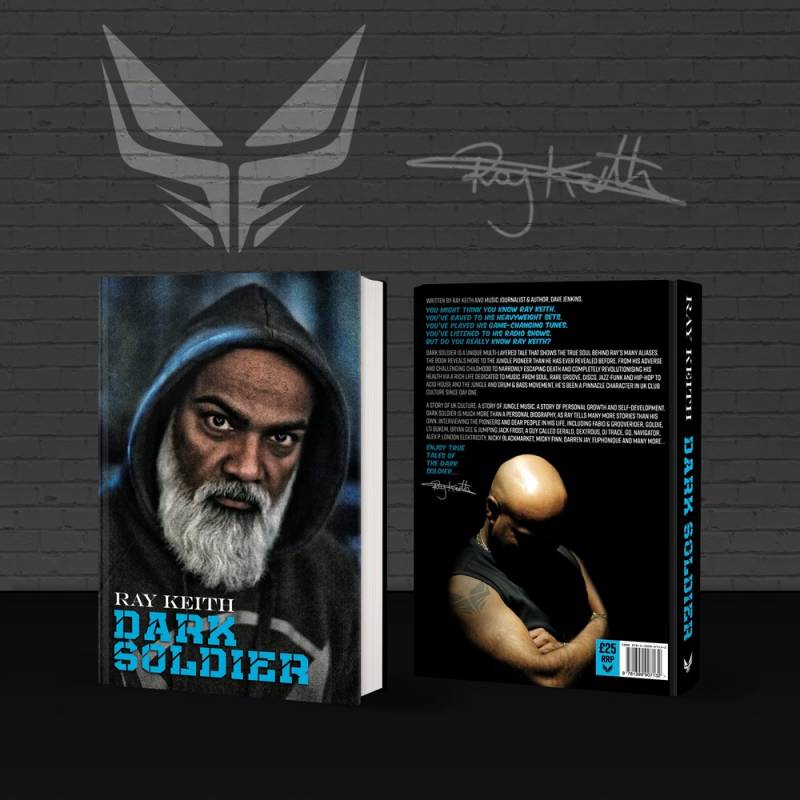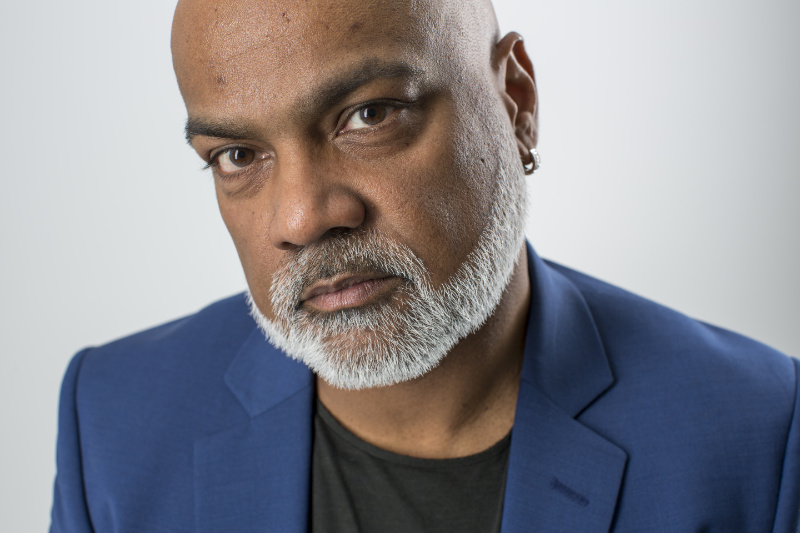We start 2022 off by launching the new Reading List series, where we pick some of our favourite books about electronic music, club culture and everything in between and talk to their authors. The first title on our reading list is Ray Keith’s Dark Soldier. Whether you know him as Ray Keith, Renegade, London’s Most Wanted or The Dark Soldier; if you’re into UK dance music records that keep the spirit of jungle alive with furious Amen-break flavour, chances are you’ve encountered one of Ray’s productions. For Dark Soldier, Ray transitions from the Technics to the page to tell us his complete story.
Released in December 2021, the book was co-written with music journalist Dave Jenkins and Velocity Press had a hand in publishing this book. It’s the first title we’ve contract published (a service we provide where we use our skills, contacts and expertise to make books for clients). Ray published it on his own Dread Recordings imprint as a testament to his drive to stay independent and keep it on the underground side. Part autobiography, part interview series with some of drum & bass’ biggest names, Dark Soldier is more than just the rave memoirs of one of jungle’s formative DJ/producers, it’s a candid tale of personal growth and overcoming the challenges life can throw at us.

What motivated you to publish the book now? Did it seem like the best time to publish it?
Well, we started writing the book about ten years ago, it was almost a product of bad luck really. It was my mate David Jenkins’ birthday, we’d talked about the idea and he was a bit down at that time so I said let’s just do it. A lot of it happened very organically over two hours of meetings every day for a year. With the book, I just wanted to make my contribution to the scene and tell it through my eyes. It’s not just a book about the scene though, it’s also about personal growth and ups and downs. I’m just a geezer from Colchester, and I wanted a chance to tell my story; it’s the story of someone who back in those days was told they wouldn’t achieve.
Did you have a collection of stories already needing to be told, or did you seek some out in order to put the book together?
I had a lot of stories already, A whole generation of ravers grew up with us, came out and danced with us but only now, social media is a thing we can all be more open about the stories that have made us who we are.
Was it an artistic choice to release the book through your label rather than another publisher?
Yes, definitely. I wanted to put it out as one of my own and self-publish it. I’ve always felt you’ve got to have a vision, if you want to put something out there you can’t dilly dally, why not do it yourself? At the end of the day, I would have been happy if I just sold one copy, you know what I mean? Making it yourself is a testament to being independent.
Coming from a background in music production and mixing. Did you find producing a book a similar process, was it completely different? Did you collaborate with anyone? Anything particularly challenging?
It was a complete ball ache, to be honest mate. It wasn’t dissimilar to making a record, but the planning side was on a whole other level. This is where I called on Colin at Velocity Press’ experience. When you reach out to someone to get them involved, you know you have to use the best. He really is a platinum star. At one time, when he was working at Kmag we were almost adversaries as I published rival mag ATM, but he’s always had time for me, always been lovely, and he had to do some really hard editorial work on the book. To me, being just faced with all those pages is really hard, so he was a massive help organising that.
It would be nice if you could just go and pick up a book like Dark Soldier from Waterstones, but for me, it’s always been about being independent. It felt like a natural progression from self-releasing records, to self-releasing a book and Velocity helped me to do that. I was proper emotional when we got it finished and the first copy arrived, just holding it in my hands, the anticipation got to me.
You grew up in Colchester, Essex which isn’t the first town that springs to mind as a hotbed of electronic music, did this hinder you as an artist at all?
Not at all really, there’s always been talent in Essex just under the surface across lots of different sub-genres. I mean, back in the 80s and 90s you had Dave Lee (FKA Joey Negro) who is still big in the house side, as well as Slipmatt/SL2 and Andy C on the hardcore, jungle and drum & bass side. Essex is so close to London too so it was easy to get to raves, clubs and record shops there as well.
Your nephew Joy Orbison is a big name in dubstep and house & techno due to the UK bass influence in his sound, which he often credits you for in interviews. Did you take active steps to get him involved in electronic music?
Well, it was always going to be about giving something back for me. It was only going to be a matter of time before we got Peter in the studio. When he played me his big track Hyph Mngo a few years ago I remember I was just blown away.
Some big names in Bass music at the moment like Coco Bryce and Tim Reaper have been looking right back to the early days of jungle and hardcore to find sounds to reimagine. Can you see those sounds coming back in a big way?
I think it’s always cool seeing youngsters live what they want to hear through the music, but we were all there at the time really. For me, in my productions, I’ve got to be looking forward rather than looking back. But anyone interested in that sound should listen to my Blueprint radio show. I still like mixing old school house stuff under Ray Von Kleef as well. We go right back to when we were all playing a bit of everything and experimenting.
How do you feel about the state of drum & bass at the moment?
To me, drum & bass is still all about freedom of expression. You’ll always get the mainstream and you’ll always get the underground. Fabio and Grooverider opened the doors up for the underground side and ever since we all developed our own styles within that. I always say there is no such thing as a shit record when someone has spent all the time making it, do you know what I mean? I mean, I am who I am today by listening to other people’s records and picking up on those foundations they have been laying. We developed our own styles after Fabio and Groove opened those doors and the youngsters are still doing the same from and growing their own styles, and pushing it.
Any names from the new guard of drum & bass that you’re particularly into at the moment?
I think some of the liquid stuff people are putting out the moment is crazy, like Sl8r.


